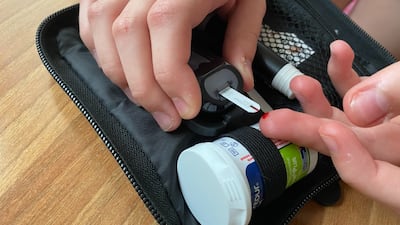The plight of a five-year-old boy awaiting an urgent liver transplant in the UAE after being born with diabetes has highlighted the importance of early testing.
Details of the child's health battle were shared on World Diabetes Day on Tuesday to show not all incidents of the disease are lifestyle related.
Most type two diabetes are a by-product of a poor diet and sedentary lifestyle, but the case has underlined why the Arab region is looking at testing in order to give the best chance in life to babies born with life-limiting monogenic diabetes.
More than half a billion people are living with diabetes worldwide, but fewer than four per cent of all diagnoses are monogenic – where genetic mutations inherited from parents lead to diabetes at birth.
monogenic diabetes specialist
Although unusual, monogenic diabetes is around three times higher in the Arab world.
One factor in this is consanguinity, where a child’s parents are related.
The five-year-old was diagnosed with diabetes at just six weeks, while doctors later recognised the symptoms as Wolcott Rallison Syndrome.
A sample was sent to a specialist centre in the UK to confirm the condition.
WRS generally leads to liver failure, kidney impairment and skeletal dysplasia, and carries a high mortality rate, leading doctors to push for a liver transplant for the child, who has not been named.
“Clinicians across the world, as soon as they've got a baby diagnosed with diabetes below six months of age, they contact us in Exeter and send samples so we can confirm the cause,” said nurse Margaret Shepherd, associate director of nursing research of monogenic diabetes at the Royal Devon University Healthcare NHS Foundation Trust.
“In this case, we were able to get a genetic test done and get that back to them within a couple of weeks, and then provide clinical advice.
“The suggested benefit now of getting an early genetic test, is finding out if it's Wolcott Rallison early on and then in those cases suggest an elective liver transplant.”

A child diagnosed below the age of six months, known as neonatal diabetes, is highly likely to have a single gene change causing the disease and should be referred for genetic testing.
For half of these cases, individuals can be treated with tablets rather than insulin injections, significantly improving their quality of life.
Most cases misdiagnosed
Around 80 per cent of those with monogenic diabetes are initially misdiagnosed as having type one due to their young age, with most cases going undetected altogether.
In the Arab world, the incidence of neonatal diabetes is about one in every 20,000 to 30,000 births compared to one in every 100,000 babies in the UK.
“In the past, it's been a very poor prognosis typically in these individuals because of the liver problems that cause a high mortality,” said Ms Shepherd.
“This is where the idea of elective liver transplant is really giving these families new hope they wouldn't have had before.
“We're able to offer the genetic testing very early, so as soon as a child is diagnosed with diabetes as a baby.
“The benefit for getting the genetic diagnosis early can greatly help with the management in those cases.”
Diabetes is a condition marked by high blood glucose, or sugar, and is classified into several types. In type two diabetes, the body does not respond normally to insulin, or is insulin resistant, with increased urination and thirst common symptoms.
The Middle East and North Africa has the highest incidence of diabetes worldwide, with 192,500 children and adolescents living with type one diabetes, and in India, where 244,500 children and adolescents are living with the disease.
The International Diabetes Federation said about 16.3 per cent of the UAE population has diabetes, compared with about 9.3 per cent worldwide.
Weight loss successful formula
Around 90 per cent of diabetes patients have type two, and it is a growing problem around the world, due to changing lifestyles.
Although type two diabetes cannot be cured, those able to manage their blood sugar levels without medication can go into remission.
Weight loss is the most tried and tested formula, but that has also created a headache for doctors.
A surge in popularity of diabetes medications as appetite suppressants has led to a worldwide shortage.
Semaglutide, also known as Ozempic, was approved for use in adults with type two diabetes in 2017 by the US Food and Drug Administration, and has seen a meteoric rise.
Although not approved for weight loss, it has been widely prescribed for that reason around the world.
Dr Mohammad Fityan, head of department at the weight management clinic at Burjeel Medical City, said the shortage posed problems for patients.
“It was really frustrating as we could not start diabetes patients on Ozempic,” he said.
“These were patients who really needed it. We had many cases where we were jumping between one medication to another as the patient would tell us it was not available anywhere.”
Typically, patients with type two diabetes would need to take medications to manage their condition for life.
The drug works by mimicking a naturally occurring hormone, which slows digestion and reduces appetite in a similar way to bariatric surgery.
A global shortage changed the way doctors treated their patients, prompting a UAE government crackdown on pharmacies administering Ozempic and other similar diabetes medication for weight loss.
“Changing medication affects patients in a negative way because when we start a specific drug, we are aiming for a certain dose,” said Dr Fityan.
“To avoid significant side effects, we start with a low dose and gradually increase it.
“When we were jumping between different brands, we were just resetting which was a waste of time.”


